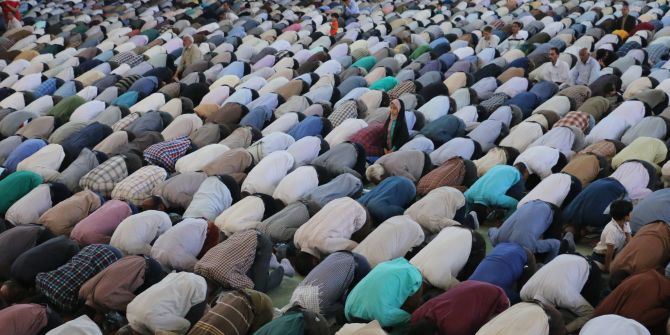In its prevailing form, the ideal of religious freedom is understood within the human rights framework that emerged in the Christian West. What of the relationship between Islam and religious freedom? Tahir Rashid provides us with much-needed theological, historical and political nuance. Religious freedom is a Quranic principle that has been both respected and disregarded in Muslim societies at different points in history. Contextualising convergences and tensions between Islam and religious freedom challenges a monolithic view of the faith.

For modern democratic societies, securing the legal and institutional protection of religious freedom has come to take the aura of a sacred command. The irreducibility of religious freedom as a moral and political good intrinsic to the well ordering of a free society is enshrined most famously in the establishment clause of the American constitution and its related motto e pluribus unum. In the last twenty years the metamorphosis of religion into a reconstructive political ideology, often legitimating an unhealthy alliance between religious majoritarianism and sovereign state power, has increasingly come to be seen as a challenge to religious freedom. At present, Christian communities in Pakistan or Gujarati Muslims in India have experienced the erosion of constitutional liberties alongside violent existential threats to their continued flourishing as religious minorities. Religious freedom, originating as a political demand predominantly amongst Protestant minorities in eighteenth-century Europe, has acquired a universal totemic significance, a rallying cry for internal advocacy groups and NGOs alike. Yet, despite the sincere intentions of many of these groups, the idea of religious freedom is often displaced from its concrete temporalities and treated as an ontological and transcendental fact removed from a certain social and historical embeddedness.
An interesting thought may be to consider whether religious freedom can be conceived outside of a normatively Christian-European-Secularity matrix. Perhaps the obvious candidate for comparative analysis here is Islam. At present, several Muslim-majority states seem to be undergoing a sacralisation of state institutions and public spaces that are often detrimental to minority expressions of religious belief. Moreover, its most vociferous proponents actively harass and humiliate religious minorities. How far Islam can accommodate the virtues of religious freedom in a world of value pluralism has become a pressing issue for our increasingly fragmented glocalised reality. Perhaps the other side of this phenomenon is that it can often legitimate a certain ethnocentrism toward Islam. All expressions of Islam are treated as monolithic, something inherently antithetical to the exclusively European post-Enlightenment values of religious freedom and liberty. We are in need of some definite conceptual ground clearing and de-polemicising when we look to consider the relationship between Islam and religious freedom.
If we turn to the Quran and the technical vocabulary of Islamic jurisprudence (usul-al-fiqh) the picture that emerges is in fact a little more nuanced. The right to choose or reject religious belief is famously revealed toward the end of surah al-Baqarah as ‘there is no compulsion in religion’ (2.256). The temptation to forcibly coerce religious obedience is strongly discouraged in favour of its free exercise. It may be argued that the command to religious freedom has never formed a centrepiece of the Quranic weltanschauung, meaning that it would be an exaggeration or aberration to elevate this into an irrevocable principle. Yet the presence of this verse is also an incontrovertible fact which I believe forces us to evaluate its moral properties and significance. If we are to read this verse in relation to those verses that recognise the monotheistic religions of Judaism, Christianity and Sabians as believers (2.62; 5.69) and people of the book, then I believe the Quran is also taking a stand on the intrinsic relation between religious liberty and a sense of human salvation as the summum bonum that believers ought to strive and seek.
There are of course several important objections to this overly ecumenical picture of Quranic hermeneutics. One is the legal categorisation of religious minorities into Dhimmi’s expected to pay a separate tax (jizya) to the Islamic polity. As Dhimmi’s, religious minorities received protection from Islamic polity and the freedom to self-regulate and administer their own communities (millet) under their own laws. Yet such freedoms came with definite restrictions on religious autonomy and a capitulation and humiliation of religious identity, echoes of which are found in Pakistan’s separate electorate ordinances (1985) promulgated by General Zia. In addition, there are also questions over the scope and degree of religious freedom one can accommodate within the legal and institutional framework of Islam. In 1995, Egypt’s sharia court declared the Arabist Nasir Abu Zayd an apostate and, under the requirements of the sharia, subsequently annulled his marriage. The charge against Abu Zayd stemmed from his work Mafhum al-Nas: Dirasa Fi-ilm al Quran (The Concept of the Text: Studies in the Sciences of the Quran) in which he suggested that we ought to consider revelation as infused with the temporalities of its historical genesis, and that by extension the prophetic conscious was not a passive blank slate but instead subjectively contributed to the conceptual basis of scripture. Under pressure from Egypt’s Islamist legal fraternity the court was forced to declare the work as heretical and Abu Zayd as transgressing the limits Sunni orthodoxy.
Yet, we must also avoid seeing this tension between Islam, the sharia and religious freedom as alienated from national and international sovereign power dynamics. The current embattled position of religious minorities and the liberal recourse to harsh penal punishments (hudood) in Pakistan is also an effect of lavish Saudi and American financial and military support to Zia’s military dictatorship in return for Pakistan’s support of the mujahideen fighters after the Soviet invasion of Afghanistan. The funding has puritanalised what has historically been a syncretic religious culture. If we turn to Abu Zayd, it is also apparent that we cannot put it solely down to Islamic intolerance but we must bear into consideration the historical evolution of religion and state dynamics in the context of a post-colonial Egyptian polity. For instance, under article 46 of the constitution, Egyptians have guarantees of free expression of religious belief. Abu Zayd was therefore correct to hold that he was merely exercising his constitutional right. However the Egypt civil code (1948) had failed to define clear (secular) guidelines for personal status and had imperfectly incorporated Islamic rules of personal status into an effectively secular civil code. As Agrama and Sfeir have shown, what this meant was that Abu Zayd was charged with violating the principle of hisba (and not any specific Quranic ruling), which was a minor hanafite legal concept that meant to threaten the public order or in this context the Egyptian state’s sovereign power.
As I have tried to show, there are both lines of convergence and difference in any constructive engagement between Islam and the freedom of religion. The Arab philosopher Mohammed Abid al-Jabri has suggested that the regressive aspects of Islamic revelation that curtail and limit a more comprehensive application of religious freedom may be overcome through a hermeneutical procedure that focuses upon the maqasid (intention/goals) of Islamic norms and legal prescriptions. However, the challenge religious freedom poses to scriptural traditions like Islam is not simply about more freedom. The Canadian philosopher Charles Taylor has suggested that freedom needs to fix itself unto a ‘strong evaluation’ that can help us with some kind of self-realisation of the good and human flourishing. In other words, religious freedom is insufficient as a purely ‘negative’ concept without giving it a thicker context that considers its past and future.
Note: This article is part of our ‘Real-World Approaches: Freedom of Religion or Belief‘ series
Note: This piece gives the views of the author, and not the position of the LSE Religion and Global Society blog, nor of the London School of Economics.





